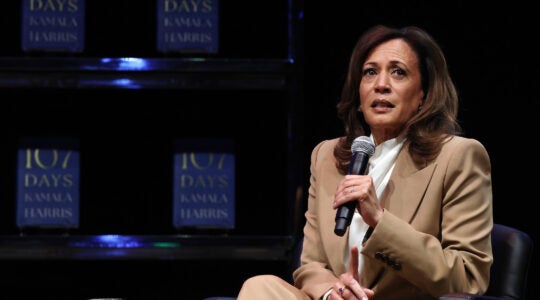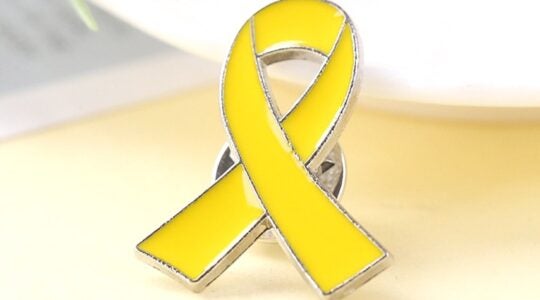WASHINGTON (JTA) – More often than not, Jewish and Muslim groups come down on the same side of battles over religious liberties.
Jewish organizations often file amicus briefs supporting Muslim religious rights in cases where zoning boards try to block the construction of houses of worship or bar the right of a Muslim to grow his beard.
“There are a lot of commonalities of interest,” said Nathan Diament, director of the Washington office of the Orthodox Union.
That made last week’s announcement by the Anti-Defamation League opposing the construction of a planned mosque near the Ground Zero site all the more remarkable. It was a rare instance of a Jewish establishment organization explicitly opposing a Muslim project or distancing itself from the role of upholding liberties for all. The $100 million mosque center was proposed by the Cordoba Initiative, a group that promotes interfaith dialogue.
Despite their common interests, however, Jews and Muslims have forged few formal alliances, mostly due to their deep differences on Middle East policy and Jewish concerns over Muslim organizations’ ties to radical groups. This has made Jewish groups ambivalent, supporting Muslim rights in principle but reticent in practice to endorse specific Muslim organizations or programs.
This ambivalence was reflected in an American Jewish Committee statement supporting the Ground Zero mosque — with caveats and demands.
The AJC “urged the leaders of the proposed center to fully reveal their sources of funding and to unconditionally condemn terrorism inspired by Islamist ideology. If these concerns can be addressed, we will join in welcoming the Cordoba Center to New York. In doing so, we would wish to reaffirm the noble values for which our country stands — the very values so detested by the perpetrators of the September 11th attacks.”
Defenders of the proposed Ground Zero mosque suggested that such calls are insulting, noting that the Cordoba Initiative and its directors, Feisal Abdul Rauf and his wife, Daisy Kahn, have a long history of pressing for a moderate, engaged Islam.
“One of the ways to prevent future Ground Zeroes is to encourage moderation within Islam, and to treat Muslim moderates differently than we treat Muslim extremists,” The Atlantic’s Jeffrey Goldberg wrote on his blog. “The campaign against this mosque treats all Muslims as perpetrators.”
On Tuesday, the mosque project at Ground Zero cleared what may have been its final hurdle before construction could begin, winning unanimous approval for the plan by New York City’s Landmarks Preservation Committee.
In recent years, Jewish organizations have defended Muslim interests in a variety of cases.
In 1999, Jewish groups defended the right of Muslim police officers in Newark, N.J., to wear beards. This year, Orthodox Jewish groups and conservative Muslim organizations both were on the losing side of a U.S. Supreme Court decision upholding the right of the University of California Hastings Law School, which receives federal funding, to reject official status for a group that discriminates on a religious basis.
In Scottsdale, Ariz., the Jewish News of Greater Phoenix reported last week that Rabbi Charles Herring joined local Muslim groups in protesting a course called “Islam 101” run by the local Board of Jewish Education. The class, taught by Carl Goldberg, included literature titled “Troubling Passages in the Koran.”
Herring, who leads a Jewish-Muslim interfaith group, noted that the Torah could similarly be misconstrued.
In Jacksonville, Fla., last May, a Jewish men’s club offered to help repair a mosque damaged in a firebomb attack. “We have a group of guys who like to do carpentry, painting or whatever we can to help out,” Ken Organes of the Jacksonville Jewish Center’s Men’s Club told the local ABC affiliate.
“That’s a commonality that comes up again and again between Orthodox Jews and religious Muslims,” Diament said, “whether it’s scheduling issues for holidays for prayer time or wearing religious clothing or grooming.”
When the issues touch on the Middle East, however, the differences emerge clearly.
In 2007, when Debbie Almontaser, the principal of the Kahlil Gibran Arabic-language school in New York, came under fire for allegedly radical views, the ADL strongly defended Almontaser until she told a New York Post interviewer that the word “intifada” meant “shaking off.”
The newspaper cast the quote as defending T-shirts that read “Intifada NYC,” and the ADL subsequently fell silent. Almontaser eventually was forced to resign after critics said she should have explained the word in the context of the Palestinian uprising against Israel. Earlier this year, the Equal Employment Opportunity Commission vindicated Almontaser, saying that her views were mischaracterized and that she had no connection with the offending T-shirts.
The Jewish hesitancy to ally formally with Muslim groups is grounded in alarms raised in the past about the supposedly radical origins and alliances of groups claiming to speak for moderate Islam.
The Council on American Islamic Relations, often cited in media reports as the Muslim equivalent of Jewish civil rights groups, had relations in the 1990s with groups and individuals subsequently identified as close to Hamas, a U.S.-designated terrorist group.
The council in recent years has issued statements distancing itself from such groups, but mainstream Jewish organizations still keep away in part because of the council’s vigorous criticism of Israeli actions. After Israel’s deadly raid on a Turkish aid flotilla attempting to breach Israel’s embargo on the Hamas-controlled Gaza Strip, the council charged Israel with a “blatant disregard for international law” and called for a reduction in military assistance to Israel.
Jewish groups have differed over associations with another Islamic American group, the Islamic Society of North America. The American Jewish Committee has refused to work with the group, citing government investigations of its alleged associations with radical Muslims, although the society was never charged with any crime. The ADL and the Reform movement have worked with the society, noting its overtures to Jewish groups and the Holocaust education it has promoted for its membership.
Abraham Foxman, the ADL’s national director, said he rejected the bigotry of some of the critics of the Ground Zero mosque but that the sensibilities of the families of the Sept. 11 victims should be paramount. The Philadelphia-based Shalom Center organized a statement from 29 Jewish lay leaders and clerics urging American Jews to press the ADL to reverse its decision.
In an interview with JTA, Foxman likened the sensibilities regarding the mosque project to those that led the Jewish establishment to oppose a Carmelite nunnery at Auschwitz in the 1980s. The nuns had good intentions, but Auschwitz wasn’t the right place for a nunnery. The Vatican ordered the nuns to leave, and they did in 1993.
“We’ve been out there as often as we can, as vociferous as we can, when signs of Islamaphobia are on the rise,” Foxman said. “And we’ll continue to be.”
JTA has documented Jewish history in real-time for over a century. Keep our journalism strong by joining us in supporting independent, award-winning reporting.





